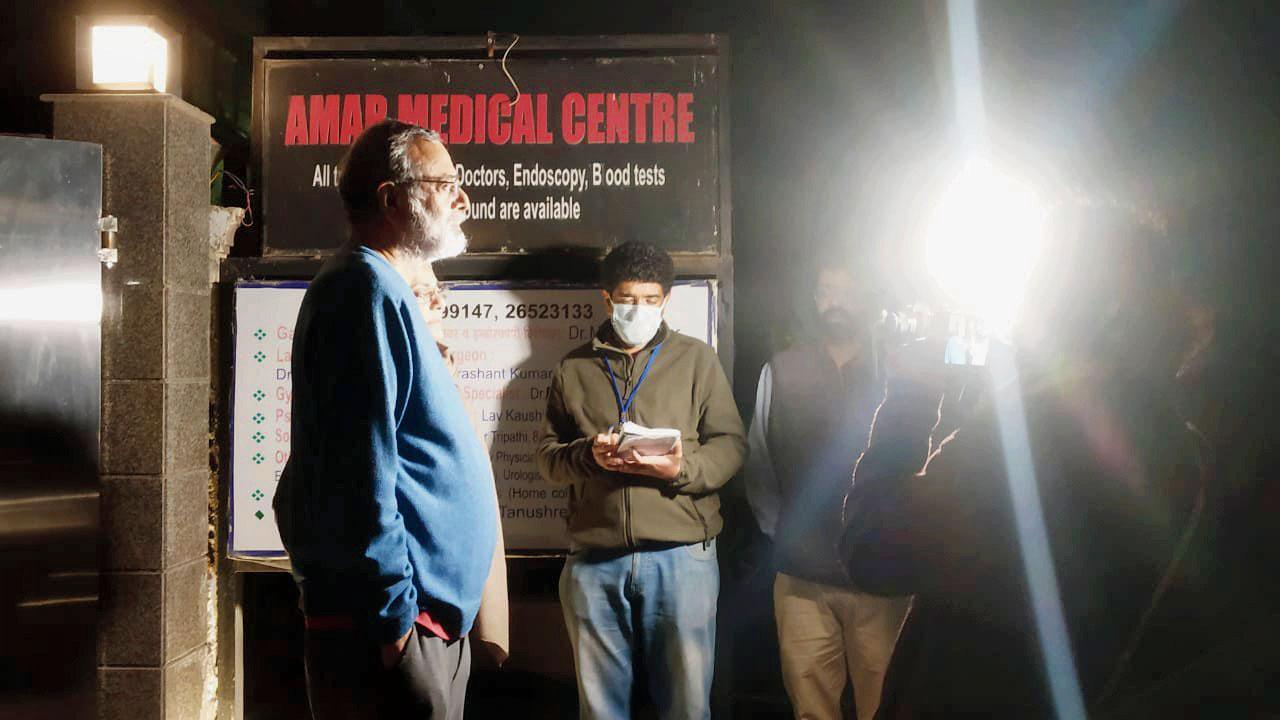Even though no formal censorship exists today as it did during the Emergency, the ED’s raid against digital news platform NewsClick is just the BJP government trying to ensure the supremacy of its narrative by vilifying media outlets critical of it

NewsClick tweeted this picture of its editor-in-chief, Prabir Purkayastha on Sunday after the raid at his residence ended. Pic/Newsclick Twitter
The Modi government seems insistent on sneering at all those who claim its attempt to undermine the freedom of media is not comparable to the censorship and detention of journalists during the Emergency. After all, there still exist today, as veteran journalist N Ram pointed out at a webinar on February 6, “spaces where you can still express condemnation of the executive….” Three days later, the Enforcement Directorate (ED) raided NewsClick, a digital news platform, which, too, belongs to spaces where “condemnation of the executive” takes place: I should know because I often write for it.
ED sleuths were ostensibly investigating NewsClick for laundering around Rs 30 crore over three years, a laughably small sum in comparison to the magnitude of financial scams that often rock India. This cannot, obviously, be a justification to demand immunity from ED raids. Nor was such a plea made by NewsClick, which, as soon as the raid began, issued a statement saying, “Truth shall prevail.”
Yet, even in the midst of the raid on NewsClick that lasted for 111 hours, ED officials found time to brief journalists. Stories were written to suggest that NewsClick could not explain its financial transactions to ED officials, an allegation made to appear credible through an assertion that their multiple attempts to contact NewsClick’s editor-in-chief, Prabir Purkayastha, did not elicit a response. The sheer absurdity of seeking responses from a person denied access to his phone and laptop did not occur to them. Nor did they sense that the ED was using them to craft a narrative regarding NewsClick before Purkayastha could surface and rebut the charge of money-laundering.
The outline of this official narrative will take a more precise shape with time. But it’s unlikely it will tell us that Purkayastha, in his youth, was imprisoned for the better part of the Emergency, in the same jail where Bharatiya Janata Party stalwart Murli Manohar Joshi, too, was lodged for a while. In his 70s now, Purkayastha faces yet another vicious strike from the state. In his story can be gauged the extent to which the present is similar or different from the darkled years of the Emergency, which generated a unique psychological response to the media.
The prevalence of censorship during the Emergency terminated the freedom of media. Yet, at the same time, the censorship diminished the media’s impact. Its consumers knew what they read, heard or viewed had been vetted and sanitised by the government. People relied on the BBC radio or gossip to update themselves on news-events they believed would have been suppressed. The people’s tendency to disbelieve the media was the reason then Prime Minister Indira Gandhi failed to indoctrinate them – and was defeated in the 1977 general election.
This lesson from the Emergency has been learnt by BJP leaders, who know a formal censorship will have the people interpret even the dissemination of facts regarding their governance as propaganda. They also know the impossibility of suppressing or sanitising information in the era of the internet, social media and smartphones. These factors have had the government to accord utmost priority to establishing the supreme dominance of its narratives. This involves exploiting the survival needs of media outlets for funds, which the government can assure by channelling its advertisements to those willing to highlight narratives beneficial to them – and denying those who do not. Private players, too, can be pressured to not advertise with the outlets unwilling to play ball.
This is perhaps why media coverage of certain type of news increasingly begins with the government’s denial or is banished to the inside pages. The latest example of this trend was The Washington Post’s scoop that evidence was planted on the computer of an accused in the 2018 Bhima Koregaon violence case. During the Emergency, a story such as the Post’s would not have been published, yet it would have circulated by word of mouth as an example of the state gone rogue. Today, it is merely a version contrary to that of the government — a version robbed of its punch because there exists no consensus among media outlets on its significance.
It is not a coincidence that raids on media outlets have been mostly against those known to speak out against the government. It is NewsClick today; it was NDTV and Quint earlier. During the Emergency, media reports on such raids would have been treated as the reigning regime’s retribution against its critics. Today, consumers of news would presume a free media would have independently verified the official allegations of financial violations before publishing them.
The outspoken are sought to be tainted and discredited, and also taught the price for exercising the right to free speech. These seemed to have been the motives for filing FIRs against journalists of the Caravan magazine, The Wire, National Herald and TV anchor Rajdeep Sardesai. During the Emergency, they would have had either the choice of falling in line or going to jail. But few would have believed the government’s calumny against them. In the age of defaming media, of which NewsClick is the most recent victim, the Emergency cannot be the touchstone for measuring the perils journalists face.
The writer is a senior journalist. Send your feedback to mailbag@mid-day.com
The views expressed in this column are the individual’s and don’t represent those of the paper
 Subscribe today by clicking the link and stay updated with the latest news!" Click here!
Subscribe today by clicking the link and stay updated with the latest news!" Click here!







